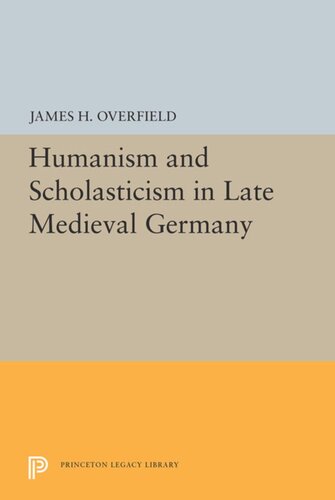

Most ebook files are in PDF format, so you can easily read them using various software such as Foxit Reader or directly on the Google Chrome browser.
Some ebook files are released by publishers in other formats such as .awz, .mobi, .epub, .fb2, etc. You may need to install specific software to read these formats on mobile/PC, such as Calibre.
Please read the tutorial at this link: https://ebookbell.com/faq
We offer FREE conversion to the popular formats you request; however, this may take some time. Therefore, right after payment, please email us, and we will try to provide the service as quickly as possible.
For some exceptional file formats or broken links (if any), please refrain from opening any disputes. Instead, email us first, and we will try to assist within a maximum of 6 hours.
EbookBell Team

4.0
56 reviewsThis analysis of the intellectual life of German universities in the fifteenth and early sixteenth centuries demonstrates that humanist-scholastic relations were not the titanic struggles depicted in the humanists' own arguments or the many modern chronicles. Eschewing neat but misleading dichotomies, the author describes the German humanists' critique of scholasticism from the 1450s to the 1510s and the scholastics' response. He traces the reception of humanists in Germany's universities, including their place in the academic corporation, the "opposition" they faced, and the pace of humanist curriculum reforms, and he places the famous Reuchlin affair and other intellectual feuds in the context of humanist-scholastic relations.
After 1500 the calls of the early humanists for the reform of Latin grammar instruction and the teaching of the studia humanitatis gave way to more encompassing attacks on scholastic theology and the philolsophical offerings of the arts course. The study draws on a wide variety of sources to describe both the gradual emergence of Renaissance humanism after 1450 and its rapid triumph after 1500.
James H. Overfield is Associate Professor of History at the University of Vermont, Burlington.
Originally published in 1985.
The Princeton Legacy Library uses the latest print-on-demand technology to again make available previously out-of-print books from the distinguished backlist of Princeton University Press. These editions preserve the original texts of these important books while presenting them in durable paperback and hardcover editions. The goal of the Princeton Legacy Library is to vastly increase access to the rich scholarly heritage found in the thousands of books published by Princeton University Press since its founding in 1905.